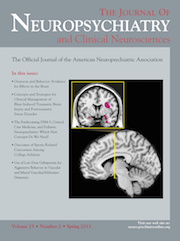Reversal of Aripiprazole-Induced Tardive Akathisia by Addition of Pregabalin
To the Editor: Akathisia, as adverse effect of aripiprazole, has been reported in literature and may be particularly distressing for the patients. We report a case of aripiprazole-induced tardive akathisia that resolved after introduction of pregabalin.
Aripiprazole is an antipsychotic drug with a unique pharmacological profile, particularly as a partial agonist to dopamine D2 receptors, but akathisia, as adverse effect, has been reported in literature and may be particularly distressing for patients.1 We report a case of aripiprazole-induced tardive akathisia that resolved after introduction of pregabalin.
The patient was a 42-year-old housewife with a DSM-IV diagnosis of bipolar disorder (BD). She was previously treated with risperidone and olanzapine without improvement and was developing EPS and weight gain. She came voluntarily to our observation at our outpatient facility in February 2011, referred by her family physician. She was taking aripiprazole 15 mg/day for approximately 8 months with complete remission. However, she complained of subjective restlessness with a constant wish to move about. The restlessness was worse at rest and was calmed by moving her legs while sitting or by walking. She was unable to sit still in one place and would constantly move her legs or walk about. The score on Barnes Akathisia Rating Scale (BARS) was 5 (severe akathisia).
She refused to stop aripiprazole because of subjective efficacy on her symptoms and lack of effects on body weight and shape. Therefore, pregabalin 150 mg/day was given in addition to aripiprazole monotherapy. Before starting the pharmacological treatment, a complete physical, instrumental, and laboratory screening (including brain MRI) was carried out and resulted negative.
After 2 weeks of pregabalin addition, we observed an improvement of akathisia (BARS: 2), without adverse effects related to pregabalin. At the end of the third week of combined therapy, the subjective and objective signs of akathisia subsided, and the score on the BARS fell to 0. The last observation was made in March 2012; the patient was taking aripiprazole 15 mg/day and pregabalin 150 mg/day, with absence of akathisia. The patient provided informed consent to present this report.
To our knowledge, this was the first observation that reported a positive effect of pregabalin on aripiprazole-induced akathisia. As pregabalin binds to the alpha-2-delta subunit of the presynaptic neuron's voltage-gated calcium channels (VGCCs), such binding reduces calcium influx, consequently decreasing neuronal hyperexcitability.2 Therefore, pregabalin reduces the release of several neurotransmitters, including glutamate, norepinephrine, serotonin, and dopamine, 3,4 and this may explain the efficacy of pregabalin on akathisia. Moreover, as a high 5-HT2A:D2 occupancy ratio may ameliorate drug-induced akathisia,5 it is possible that pregabalin may act to restore this ratio.
However, this is merely a single case report and prospective double-blind, placebo-controlled studies are certainly needed.
1 : Evaluation of akathisia in patients with schizophrenia, schizoaffective disorder, or bipolar I disorder: a post hoc analysis of pooled data from short- and long-term aripiprazole trials. J Psychopharmacol 2010; 24:1019–1029Crossref, Medline, Google Scholar
2 : Pharmacology and mechanism of action of pregabalin: the calcium channel alpha2-delta (alpha2-delta) subunit as a target for antiepileptic drug discovery. Epilepsy Res 2007; 73:137–150Crossref, Medline, Google Scholar
3 : Pregabalin, tiapride, and lorazepam in alcohol withdrawal syndrome: a multi-centre, randomized, single-blind comparison trial. Addiction 2010; 105:288–299Crossref, Medline, Google Scholar
4 : Treatment of restless legs syndrome with pregabalin: a double-blind, placebo-controlled study. Neurology 2010; 74:1897–1904Crossref, Medline, Google Scholar
5 : Aripiprazole’s receptor pharmacology and extrapyramidal side effects. Am J Psychiatry 2008; 165:398, author reply 398–399Crossref, Medline, Google Scholar



